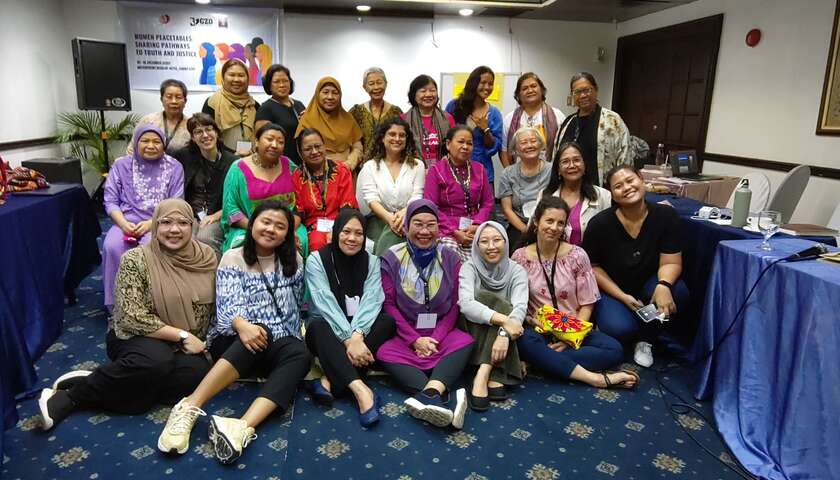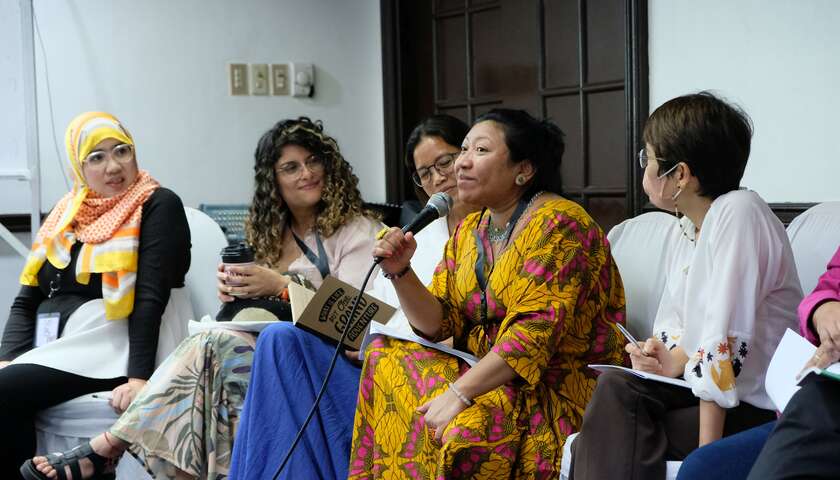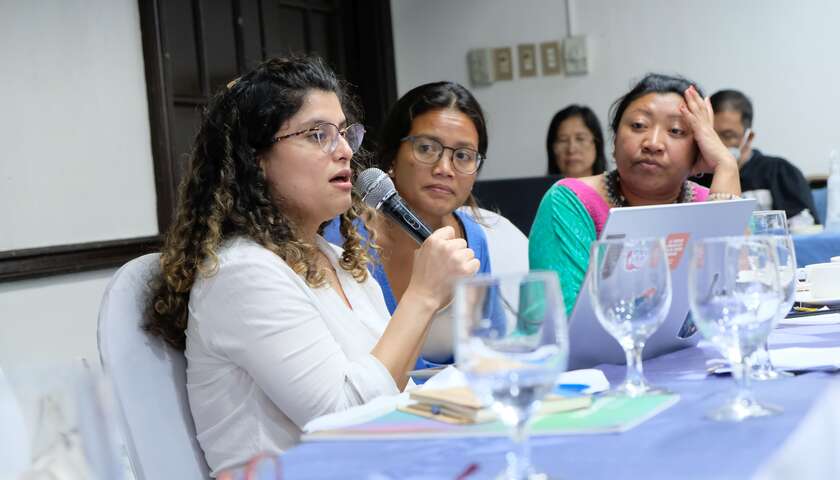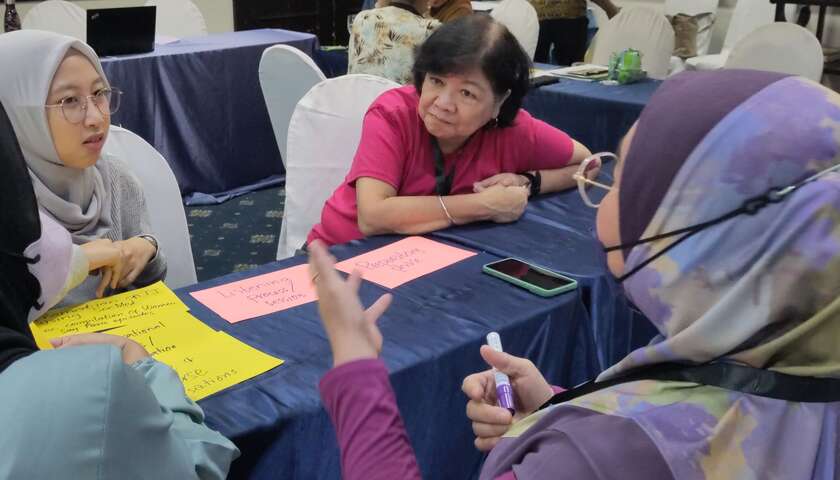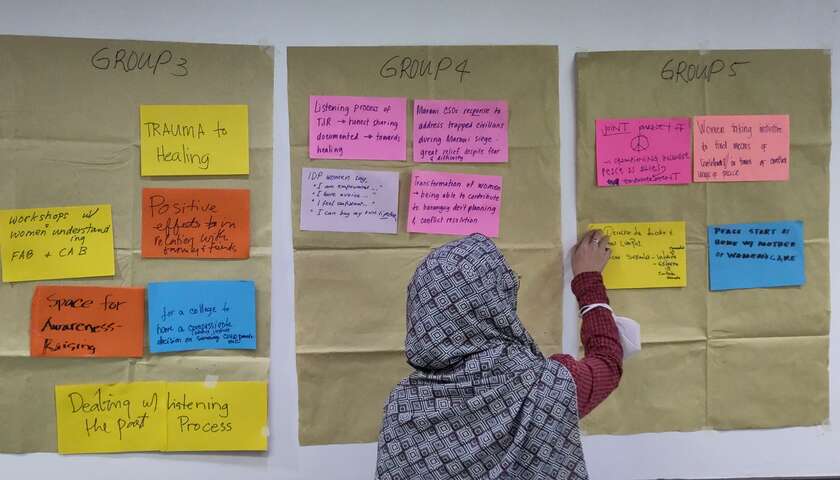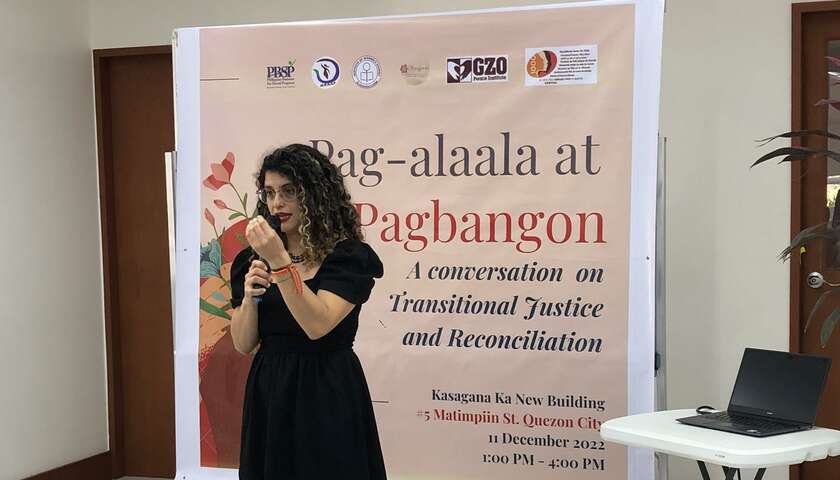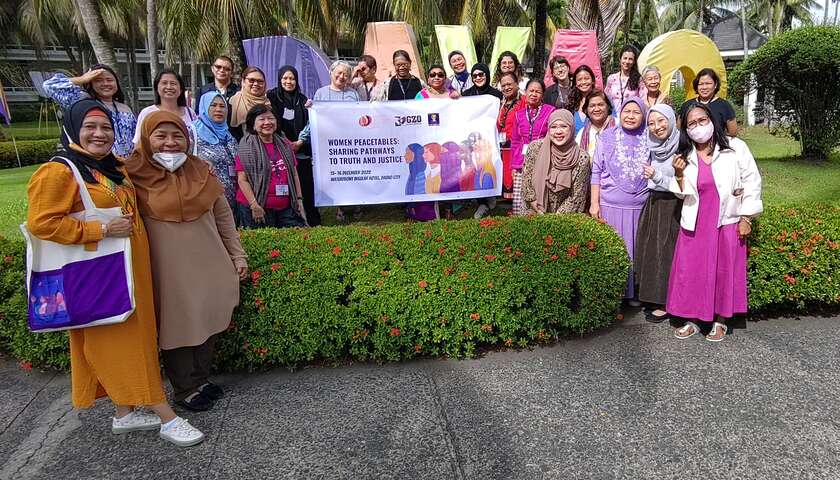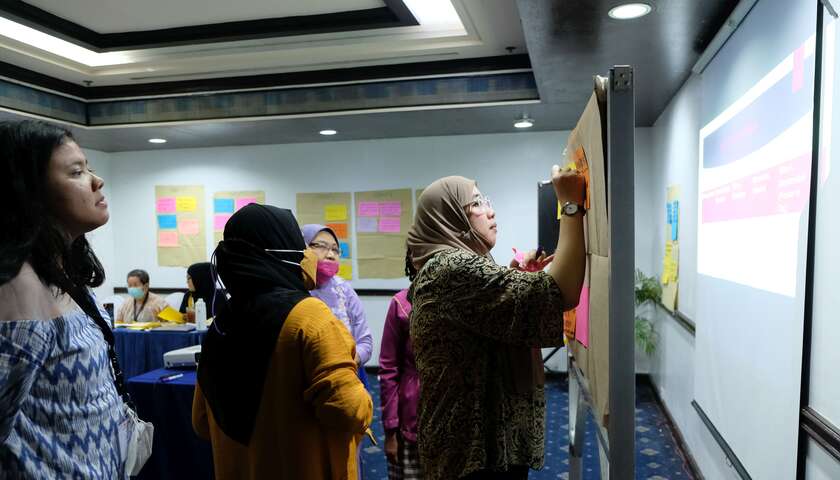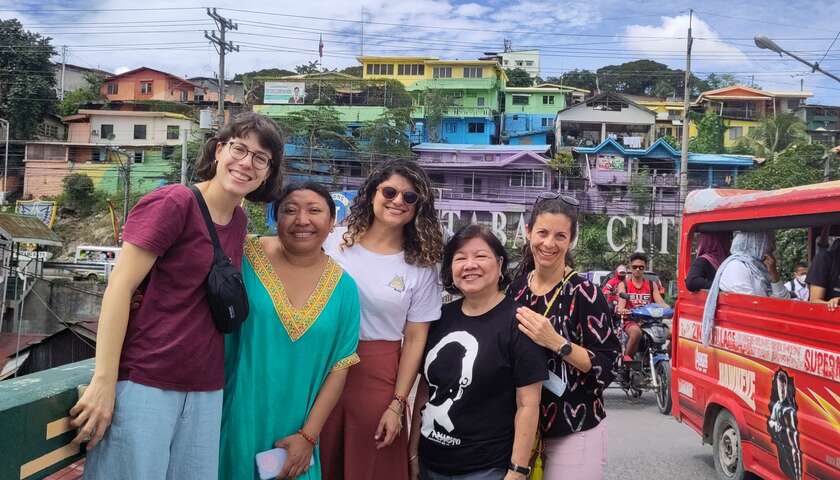Publication: From Transition to Transformation
Making peace processes more gender-sensitive
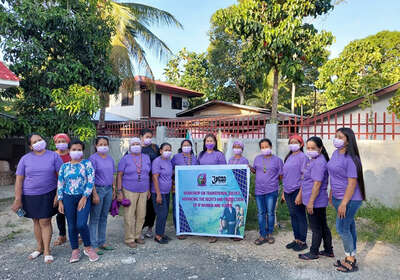
It was a unique exchange that we were able to organise with our partners in the Philippines in December: at various events, two representatives of the Gender Working Group of the Colombian Truth Commission exchanged their experiences with peace activists from the Philippines. Many moments of recognition and understanding emerged at during these exchanges. Our programme managers Andrea Filippi and Karin Widmer were there.
What was the purpose of the trip?
Andrea: The central idea of the trip was to learn from each other, exchange best practices and gain ideas and inspiration for our own project work. At a face-to-face meeting in Bern in 2019, the idea arose that a visit to the Philippines by a representative of the Gender Working Group of the Colombian Truth Commission would be valuable for the activists involved in the Bangsamoro peace process. The Covid pandemic intervened. In March 2022, we published “From Transition to Transformation”, in which our partners in Colombia, Nepal and the Philippines shared their insights from the peace processes. At the online launch event, they again expressed their desire for a learning exchange.
What common goals did you pursue?
Karin: We formulated the concrete goals with our project partner in the Philippines, the Gaston Z. Ortigas Peace Institute (GZOPI). With the exchange of experiences, we wanted to motivate and inspire women working on transitional justice [TJ] in the Philippines and in Colombia. In addition, we wanted to support the recommendations from the report of the Philippine Transitional Justice and Reconciliation Commission TJRC to receive more attention and finally be implemented. And, we want to make the learnings from this trip available to other women working on TJ.
Who were the key figures on this trip?
Karin: Besides Andrea and me, they were: Karen Tañada, the GZOPI director, who coordinated the activities with her team and network of women's and peace organisations. Remedios Uriana is a Wayuu indigenous woman from the north of Colombia, and Juliana Rodríguez López comes from the department of Cauca. Remedios and Juliana were both members of the Gender Working Group of the Colombian Truth Commission, whose mandate ended in the summer of 2022. They are also active in the feminist peace movement in Colombia.
You participated in various events and meetings. What were they about?
Karin: We organised a number of events, meetings and visits in the capital region and in Mindanao in the south of the Philippines: two public conferences, a Women's Peace Table, a closed meeting with widows affected by the so-called "drug war", a visit to the Swiss Embassy, and visits to the Martial Law Museum and the memorial wall for the victims of the Marcos dictatorship, among others.
Andrea: It was about learning from each other, exchanging good and not so good experiences, gaining insights into the work of others and thus inspiration for our own project work. Experts and directly affected people from the Philippines gave us an understanding of the local context through presentations and testimonies. Time and again we were able to feel and directly experience their emotions, for example at memorial sites and during cultural activities. Remedios and Juliana let us share their intense experiences as members of the Gender Working Group. With pictures, videos and personal stories, they made the years of work, the challenges and successes of the Colombian Truth Commission come alive for us. In the words of Karen Tañada: "It was a great opportunity to discuss and deepen knowledge about TJ with previous and new partners, especially in relation to truth commissions."
Which topics arose most frequently at these events?
Karin: The importance of civil society engagement and active participation in peace processes across categories of difference not only came up often but was repeatedly confirmed. The exchange between key figures and those who are directly affected seems central to me. Remedios and Juliana emphasised this, as did the actors in the Philippines. It was expressed particularly clearly in the shared experiences of the so-called "listening processes". These focus group discussions were the main method used by the TJRC in the Philippines to listen to those directly affected and to document their testimonies.
Andrea: Regarding listening processes and recording testimonies, it was repeatedly discussed that both individual and collective listening are central. It is also important that people can testify in their own language. The common definition of and search for appropriate local and indigenous terminologies for "transitional justice" were also emphasised. A common theme was the intersectional focus of the Colombian Gender Working Group, which was anti-racist from the start, included Afro-Colombian and indigenous perspectives, and focused on the experiences of women and queer people, including all age groups where possible. The importance of this intersectional approach was reiterated by various participants at the Peace Table in Davao City and identified as a perspective that peace activists would like to strengthen in the Philippines.
Karin: On such occasions, the mental and physical strain of processes of coming to terms with the past is often mentioned. The experiences described by those directly affected, the immense commitment of those who document these accounts and the emotional challenges involved leave their mark and open wounds. Self-care and collective healing processes are central. Sharing memories and individual experiences helps you to process. What fascinates me is how these spaces for sharing are shaped by the individuals and by cultural aspects. What connects the people in the space and helps them to process the past is the act of sharing.
Did you notice any similarities?
Karin: I am always struck by how meaningful sharing experiences across contexts and borders can be. Inspiring each other and passing on hope, beyond measurable indicators, are so important for peace work. Encouraging each other in the hope that our individual and collective commitment to just and inclusive peace matters, that it is worthwhile not to give up, and that we can make an impact in small and large ways are at the core of peace work worldwide in my understanding. "How can we make transitional justice and reconciliation a goal to break the silence? We have to believe that a steady drop still fills a bottle," said a participant at the Peace Table.
Andrea: A shared experience is that peace work and coming to terms with the past require stamina. The political will, or unfortunately often the lack of political will to deal with the past, is a reality in many contexts. Therefore, as Karin has already emphasised, individual as well as collective (self-)care is central to maintain the strength for peace work over a long period. Feminist networks are central to collective organising.
Which moments do you remember most clearly?
Karin: My memories of our project trip are very vivid and colourful. I remember the Women's Peace Table particularly clearly because we were able to share our experiences and emotions in a safe setting. The participants said they continue to believe in peace and would work to ensure that their daughters do not have to experience what they did: "I can forgive, but I cannot forget," said one.
The importance of the sisterhood across borders and language barriers has impressed itself on me. I can still see the intimate and tearful embrace between Yasmin and Bencita, one a Muslim and the other an indigenous peace activist, both of whom have been involved for years in peace work in their community and at government level, as internally displaced persons and as directly affected people. I remember Remedios' and Juliana's self-reflections and insights that emanated from the trip, which took place a few months after their mandate with the Colombian Truth Commission ended: "This exchange helped me to look back and realise new things," Remedios said.
Andrea: The journey will stay with me and nourish me for a long time. I remember many things, especially this Peace Table. It made me feel on an emotional level how important safe spaces are for sharing and strengthening each other. The personal encounters and connections with so many different people have left a lasting impression on me. A short conversation with Yasmin Busran Lao, former member of the Philippine government's peace negotiation panel for talks with the Moro Islamic Liberation Front, remains clear in my memory. We talked about the great importance of transnational feminist networks and how we can support each other and stand in solidarity with the struggles of others. I will take that with me for my further work. Again and again, I have been struck by how similar our challenges are, despite contextual differences and differences in their extent. We are all confronted with the backlash and resistance to inclusive feminisms and processes.
What is next for our work in the Philippines?
Karin: The current project "Women's Peace Tables in Nepal, Colombia and the Philippines: Strengthening Women's Effective Participation in Conflict Transformation" will continue until the end of 2023. We are supporting GZOPI in its efforts to ensure that the recommendations on transitional justice are implemented. At the Peace Table, participants from the Philippines developed concrete actions and campaign strategies to further advance the TJ agenda. In doing so, they were inspired by the experiences from Colombia and integrated them into their plans.
Andrea: A key finding for me is that learning together, sharing, inspiring each other to re-energise and generate new ideas is essential. The evaluation confirmed once again that we need to systematise the knowledge generated in order to be able to share it with wider circles – how can we capture and process knowledge so that it reaches the target groups? We want to keep all this in mind in our continued work.
What did the partners in the Philippines highlight?
Karin: The implementation of the inclusive and intersectional approach of the Colombian Gender Working Group and their realisation that in the more conservative context in Bangsamoro, it is relevant to make transitional justice and reconciliation gender responsive. Karen's insight in her report on the trip: "It was important to raise this awareness, as in the context of Bangsamoro especially the LGBTIQ+ perspective is a bit tricky. There is a lot of acceptance of this issue among the activists. It is an issue that we should pay more attention to." Participants also mentioned promoting intergenerational dialogue: "Today's generation doesn't know what happened yesterday."
What do the partners take from the exchange with the two women from Colombia?
Karin: Remedios' and Juliana's concrete experiences are primarily a motivation for the actors in the Philippines: "Their intense and profound experiences have made the challenges and importance of transitional justice and especially the role of women in these processes clearer and more meaningful," Karen wrote in her report.
Find out more about our work in Colombia and the Philippines
